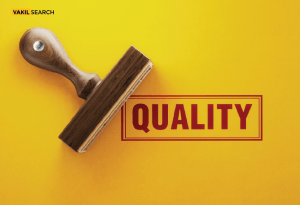Introduction
In a major move to enhance consumer safety and product reliability, the Indian government has expanded its quality compliance requirements. The initiative mandates Quality Control Orders (QCOs) for more than 150 products, covering a wide range of sectors, including household appliances, furniture, steel, and petrochemicals. This effort aims to prevent the circulation of substandard products in the market while strengthening domestic manufacturing.
Stricter Quality Control Measures
The Bureau of Indian Standards (BIS) has outlined the new requirements, emphasizing their significance in maintaining quality benchmarks. These standards are designed to align Indian products with global safety norms, ensuring better consumer protection. The QCOs will impact a diverse range of items, enforcing stricter quality regulations across industries.
The government’s move to implement these measures is part of a broader strategy to curb the influx of low-quality imports while bolstering local production. By enforcing these standards, authorities seek to establish India as a global leader in manufacturing excellence.
Products Under the New Regulations
The list of affected products includes electrical appliances, furniture, steel, and chemical goods. Electrical devices operating on 250V single-phase or 415V three-phase power must comply with the new standards by March 20.
Manufacturers in the furniture sector must adhere to quality norms for products such as block boards, plywood, and wooden flush doors. The steel industry is also under scrutiny, with new regulations targeting hot-rolled and cold-rolled steel strips. Meanwhile, household goods such as electric water heaters and solar water heating systems will also fall under the compliance mandate.

BIS to Oversee Implementation
To ensure smooth enforcement, the BIS has taken charge of overseeing the implementation of these quality orders. The agency has pre-listed over 150 products in advance, allowing manufacturers sufficient time to comply with the regulations.
A BIS spokesperson stated, “The introduction of these mandatory standards is essential to prevent the import of substandard goods and guarantee consumer access to high-quality products. Our goal is to create a strong compliance framework that benefits both manufacturers and end-users.”
By setting clear enforcement deadlines, the government aims to streamline the regulatory process, giving industries enough time to transition to the new quality standards.
Growth in QCO Coverage Over the Years
The number of products under QCOs has grown significantly over the years. In 2014, only 106 products were covered under such regulations. However, by October 2024, this number had surged to over 732. This steady expansion indicates the government’s commitment to establishing a more robust quality control framework.
The rise in the number of regulated products also reflects India’s push toward self-reliance. By reducing dependency on imported substandard products, the country aims to boost domestic manufacturing and innovation.
Impact on the Chemical and Petrochemical Sectors
Apart from consumer goods, the chemical and petrochemical industries will also witness stringent regulations. The new standards will apply to various fatty acids, including those derived from palm, rice bran, and coconut sources.
Industry experts believe that these changes will enhance the quality of raw materials used in manufacturing, leading to better end products. Compliance with these new standards will ensure that manufacturers follow international best practices in quality control.

Challenges for Manufacturers
While the move is expected to boost product quality, manufacturers may face initial challenges in adapting to the new standards. Compliance will require changes in production processes, additional testing, and certification, which may increase operational costs.
Small and medium enterprises (SMEs) could be particularly impacted, as they may require financial and technical assistance to meet the new quality benchmarks. The government has assured support for businesses through various schemes aimed at easing the transition.
Consumer Benefits and Market Growth
The stricter compliance requirements will ultimately benefit consumers by ensuring that only high-quality products reach the market. Enhanced product durability and safety measures will lead to greater consumer confidence.
Additionally, improved quality standards will help Indian manufacturers compete in international markets. With global buyers prioritizing high standards, Indian products that meet these compliance requirements will have better export potential.
Conclusion
The expansion of quality compliance requirements for over 150 products marks a significant step in India’s journey toward manufacturing excellence. By enforcing QCOs, the government aims to eliminate substandard goods, protect consumers, and strengthen domestic production.
While the transition may present challenges for manufacturers, the long-term benefits of enhanced quality, better market credibility, and increased global competitiveness will outweigh the initial hurdles. As the country continues to align with global standards, these regulations will play a crucial role in shaping the future of India’s manufacturing sector.
Stay updated with the latest news and other trending updates! Visit Vakilsearch News for exclusive insights.
- Government Enforces Quality Compliance for 150+ Products - February 6, 2025
- Vivo V50 India Launch: Key Differences from Vivo V40 - February 4, 2025
- Indian Law Student’s Post Ignites Debate on Work Culture and Life - February 3, 2025

